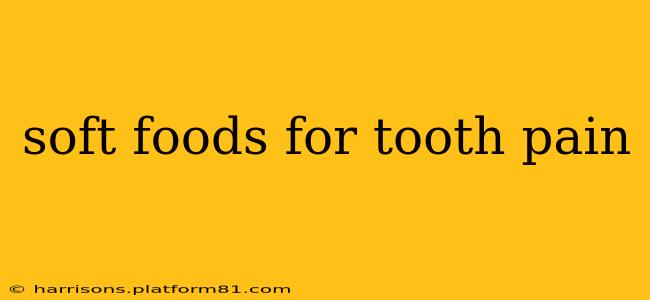Tooth pain can be excruciating, making even the simplest act of eating a challenge. Finding the right foods to nourish yourself without exacerbating the pain is crucial for comfort and recovery. This guide explores soft foods perfect for managing tooth pain, addressing common questions and concerns. We'll delve into what makes a food "soft," offer specific recommendations, and discuss nutritional considerations to ensure you're getting the nutrients you need while recovering.
What Makes a Food "Soft" for Sensitive Teeth?
The ideal soft food for tooth pain is easily chewed and swallowed, requiring minimal jaw movement. Texture is key; avoid anything crunchy, hard, or acidic. Think creamy, smooth, and easily mashed. The temperature also matters; very hot or cold foods can further irritate sensitive teeth. Lukewarm is generally best.
What are Some Good Soft Foods for Tooth Pain?
Here are some excellent options, categorized for easy browsing:
Dairy Delights:
- Yogurt: Plain yogurt, especially Greek yogurt, is packed with protein and calcium, essential for oral health. You can add a touch of honey for sweetness.
- Milkshakes: Blend your favorite fruits (soft ones like bananas or berries) with milk or yogurt for a nutritious and refreshing treat. Avoid ice cream, as it's too cold and hard.
- Cheese: Soft cheeses like cottage cheese, ricotta, or cream cheese are easy to eat and provide calcium.
Fruit & Vegetable Purees:
- Applesauce: Unsweetened applesauce is a good source of fiber and vitamins.
- Mashed sweet potatoes: Naturally sweet and packed with nutrients.
- Avocado: Creamy avocado can be enjoyed on its own or blended into smoothies.
Soups & Broths:
- Broth-based soups: Choose soups with tender vegetables and lean proteins. Avoid chunky soups or those with hard noodles or grains.
- Creamy tomato soup: The smooth texture and warmth are soothing. Just make sure it's not too hot.
Grains & Other Options:
- Oatmeal: Cooked oatmeal is a gentle option, especially if blended to a smoother consistency.
- Mashed bananas: Easy to digest and naturally sweet.
- Scrambled eggs: Cooked until soft and fluffy, scrambled eggs provide protein.
What Should I Avoid When I Have Tooth Pain?
Stay away from these troublemakers:
- Anything hard or crunchy: Nuts, chips, crackers, hard candies.
- Acidic foods: Citrus fruits, tomatoes (in some cases), sodas, and vinegar.
- Extremely hot or cold foods and drinks: These can aggravate sensitive teeth.
- Sticky foods: Caramel, toffee, and gummy candies can stick to your teeth and worsen pain.
Can I Eat Solid Foods if I Have a Toothache?
The ability to eat solid foods with a toothache depends entirely on the severity of your pain and the cause. A minor ache might allow for softer solid foods, but intense pain necessitates sticking to the soft food diet until the pain subsides. If the pain is severe or persistent, consult a dentist immediately.
What Kind of Drinks Are Best for Tooth Pain?
Similar to food choices, focus on lukewarm drinks. Water is always best for hydration. Avoid acidic drinks like juice or soda. Herbal teas (lukewarm) can be soothing.
How Long Should I Stick to a Soft Food Diet?
The duration depends on the cause and severity of your tooth pain. For minor discomfort, you might only need a few days on a soft food diet. For more significant issues like an extraction or abscess, your dentist may recommend a longer period. Always follow your dentist's advice.
What Nutrients Should I Focus On While Eating Soft Foods?
Focus on getting enough protein, calcium, and vitamins. While soft foods may restrict some options, strategic choices can ensure a balanced diet.
This guide provides general recommendations. Remember to consult with your dentist or doctor for personalized advice regarding your specific situation. Their expertise ensures you receive the best possible care and guidance during your recovery.
